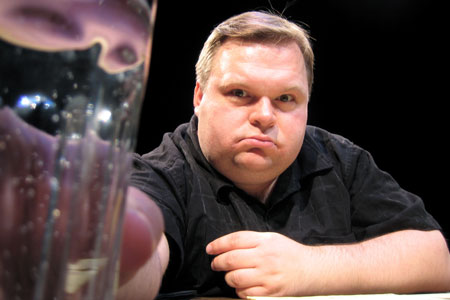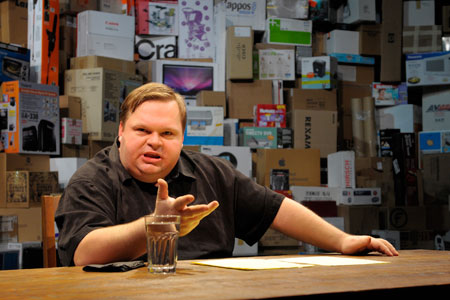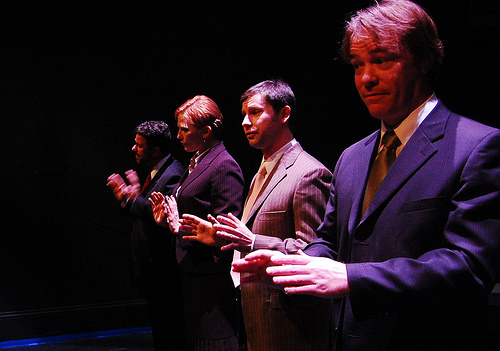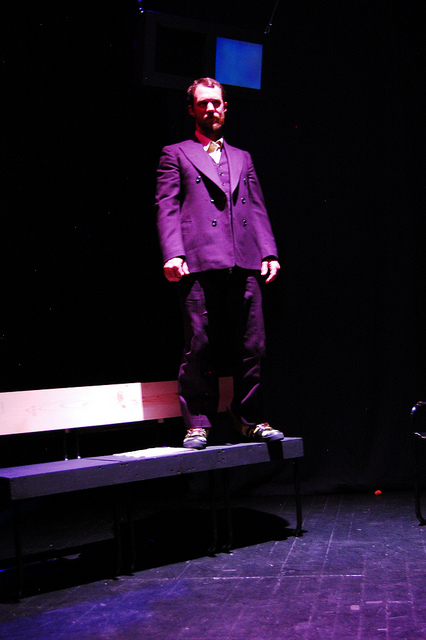
During the 1992 Presidential election, Bill Clinton's campaign team hit on a slogan that was easy to pronounce and just as easy for people to understand: "It's the economy, stupid!" By that time, the trickle-down economics of the Reagan era had proven to be a ridiculous theory. The fact that President George H.W. Bush had no idea what the price of milk was didn't help matters, either.
As the Internet has grown and computers have taken on spectacular efficiencies in moving money, global economies have seen financial transactions increase in their speed and societal impact. Fraudulent practices like Bernie Madoff's exclusive pyramid scheme for the wealthy -- or the implosion of the real estate market due to wild gambling with credit default swaps -- have caused the fortunes and financial security that many investors and homeowners took for granted to evaporate into thin air.
On December 5, 1996, Alan Greenspan (who was then Chairman of the Federal Reserve Board) asked an audience at the American Enterprise Institute: "How do we know when irrational exuberance has unduly escalated asset values, which then become subject to unexpected and prolonged contractions as they have in Japan over the past decade?" Although Greenspan's use of the term "irrational exuberance" has been referred to quite often since the global financial meltdown of 2008, if you really want to see what "irrational exuberance" looks like you should start with this clip from Busby Berkeley's 1933 movie musical, Golddiggers of 1933 (in which Ginger Rogers sings one verse of "We're In The Money" in pig latin):
Need another example? How about Ethel Merman asking "Could You Use Any Money Today?" in Irving Berlin's 1950 hit musical, Call Me Madam?
The past decade has produced numerous documentaries about the perils of the new global economy. They include:
- Alex Gibney's 2005 documentary about Enron entitled The Smartest Guys in the Room
- Chris Smith's 2009 documentary entitled Collapse, which deals with Michael Ruppert's ominous conspiracy theories.
- Stelios Kouloglou's 2009 documentary entitled Confessions of an Economic Hit Man.
- Michael Moore's 2009 documentary entitled Capitalism: A Love Story.
- Þorfinnur Gudnason's 2009 documentary about Iceland's political, economic, and financial crisis entitled Dreamland (What Do You Own When You've Sold Everything?).
- Charles H. Ferguson's Inside Job (which won the 2010 Academy Award for Best Documentary Feature).
However, it is the work of playwrights, with their amazing gift of theatrical license, to dramatize complex economic concepts in a way that can be understood by the average audience. In his 1955 hit play, The Matchmaker, Thornton Wilder wrote that "Marriage is a bribe to make a housekeeper think she's a householder."
One of my favorite Thornton Wilder quotes comes from Act II of Hello, Dolly! (which was based on The Matchmaker). Dolly Levi lovingly wraps her arms around the cash register in Horace Vandergelder's Hay & Feed Store and says:
"Money, money, money, money, money!! It's like the sun we walk under. It can kill or cure. Horace Vandergelder never tires of saying that 99% of the people in this world are fools. And I suppose he's right. We're all fools: Himself, Irene, Cornelius, myself. We're all fools and we're all in grave danger of destroying the world in our folly. And yet the surest way to keep us safe from harm is to give us those few things in life that will make us happy. And that takes a little bit of money.
Now, the difference between a little bit of money and no money at all is enormous, and it can shatter the world. And the difference between a little bit of money and an enormous amount of money is very slight. Yet that, too, can shatter the world. It's all a question of how it's used.
As my late husband, Ephraim Levi, always used to say: 'Money -- you should pardon the expression -- is a little bit like manure. It doesn't do anyone a bit of good unless it's spread all around, encouraging young things to grow.'"
At its most daring, art is a subversive phenomenon that forces people to look beyond the safety of the status quo. Two new pieces of theatre do a stunning job of examining the recent global financial crisis caused by credit default swaps and other fraudulent financial practices.
* * * * * * * * *
In the past year, Mike Daisey has toured the nation performing one of his most powerful and daring monologues: The Last Cargo Cult. In 2006, one of the most popular television reality shows named its ninth season Survivor: Vanuatu -- Islands of Fire. Daisey's excursion to research the John Frum celebrations on the island of Tanna in Vanuatu proved to be just as challenging as the Survivor series. But none of those people were using Vanuatu as source material to research a dramatic monologue about world financial markets, tribal customs, the glories of IKEA, and the best way to survive an automobile accident in the Hamptons.

Mike Daisey (Photo by: Ursa Waz)
Few, if any of the contestants on Survivor could match Daisey's intellectual powers, creative talents, or skills as a performance artist. I mean, let's be honest. How many people do you know who can sit at a desk for two hours -- with a glass of water as their only prop -- and hold forth on the terrors of exploring the South Pacific in a puddle jumper that must land in wet grass as the natives emerge from the jungle, the gold standard, tribal coming of age rituals that involve a poor, porcine target, and what it feels like to stand on the rim of an active volcano?
In the following clip (recorded when Daisey was performing The Last Cargo Cult at The Public Theatre in New York), the actor and his wife and collaborator, Jean-Michele Gregory, explain what inspired them to create The Last Cargo Cult.
Daisey's kind of theatre requires that the audience pay close attention and follow carefully. His strengths as a storyteller allow him to take daring theatrical risks -- like telling the audience they don't really count because they'll be replaced by another audience the next night. Imagine an elephant seal as a prosecuting attorney, a moose capable of skinning and field dressing Sarah Palin, and you have some idea of what your evening's personal guide through mankind's follies is like.
As a performer who does not rise from his chair until the end of the show, Daisey is remarkable in his ability to paint pictures with his eyes, his jowls, his arms, and a voice that ranges from seething cynicism to shocked disbelief and near operatic bellicosity. As a writer with a sense of irony that vacillates between shock, awe, and disgust, his performances are remarkable for their probative analysis, the wealth of content they deliver, and the sheer entertainment value Daisey brings to each performance.

Mike Daisey in The Last Cargo Cult
Photo by: Kevin Berne
Whenever I have seen Daisey perform one of his monologues, I've been amazed by the amount I've learned, the magnificent editing in his work, and the sheer theatricality of his presentation. This is one of the rare artists who gives 150% to his audience and leaves them wanting more.
Daisey also is one of the few performers brave enough to challenge an audience to let him know what the experience was worth to them. As the audience enters the theatre, each person is given a bill of one denomination or another. Whether or not they return the money at the end of the show is a stunning test of the true nature of each member of the audience and whether or not such people can honestly put a value on Daisey's art. The following clip offers some key moments from The Last Cargo Cult .
* * * * * * * * * * * * *
San Francisco's Exit Theatre is currently hosting the world premiere of a brilliant new play by Bennett Fisher. Presented by No Nude Men Productions and directed by Tore Ingersoll-Thorp, Hermes does an astonishing job of explaining the similarities between believing in god and believing in debt.
The play's premise is simple: Soon after a god returns to earth, the world comes to an end. Fisher stresses that:
"While researching the role Goldman Sachs and other American financial institutions played in the most recent financial collapse, I found it very difficult to get a straight answer. I did not intend for this play to be a reenactment of the Greek financial meltdown; I wanted to use the meltdown -- along with the gods Hestia and Hermes, along with the sort of fraud perpetrated by companies like Enron -- as a lens to examine opportunism, indifference, greed, possibility, power, and humanity. In my mind, it is less a play about history, mythology, politics, or economics than it is about people."

Gil (Carl Lucania), Anne (Juliana Egley), Jack (Geoff Nolan),
and Brian (Brian Markley) make their sales pitch in Hermes.
Photo by: Claire Rice
The humans in Fisher's play are a quartet of hard-drinking, greedy Wall Street gamblers who (while stuck in Europe because of mass flight cancellations following the eruption of Iceland's Eyjafjallajökull volcano) see an opportunity to manipulate the financial crisis in Greece to their advantage. Debating which sales technique will work best (the Big Bird, Chicken Little, or Jenny Craig approach), they cling to the basic truism that, even in the worst of circumstances, "business finds a way."
Then the youngest among them comes up with a brilliant idea. Jack has the gall to suggest that the others may be "too old" to grasp his concept. A noticeable chill enters the room.
However, Jack's idea has not gone unnoticed. Usually seen as a messenger in Greek mythology, Hermes also acts as the god of commerce and thieves. Slimier and far more aggressive than Bernie Madoff or Gordon Gekko, Hermes has been crafted by Fisher to act as the physical manifestation of fraud. Clad in a pair of winged golden sneakers, he takes great delight in punching financial cowards in the balls. In his writer's statement, Fisher stresses that:
"Hermes is frequently cast in the role of a trickster, a mythological archetype present in many traditions other than the Greeks. But, more than this, he is the god of surrogates and substitutes. Language and mathematics allow us to order the natural world, separating that indistinct jumble of atomic particles that is existence into individual and identifiable parcels. Commerce and trade operate under the principle that a value can stand in for an object. If the truth is undesirable, a lie can be used instead.
In my opinion, Hermes' dominion, inventiveness and expressiveness, represent the highest form of human thought. Hermes allows us to think of something greater than ourselves. Poseidon and Demeter have sway over distinct skills like sea travel and agriculture. Gods like Dionysus, Athena, and Apollo correspond to even more abstract concepts like justice and art. But it is Hermes' areas of influence that facilitate each of these. Slippery logic and artful language are more fearsome than thunderbolts. Greed and poverty level more houses than war. Hermes alone allows man to transcend what is tangible, to devise and articulate concepts that have only a tenuous connection to the physical world. Hermes allows us to be human."

Brian Trybom as Hermes (Photo by: Claire Rice)
With his rough-and-tumble script about corporate greed and the illegal manipulation of global financial markets, Fisher's daring and extremely intelligent play offers a solid dramatic counterpoint to some of Matt Taibbi's investigative journalism about the current financial crisis in Rolling Stone Magazine. His ability to dramatize man's talent for making a profit off of something that is truly worthless delivers a breathtaking experience in relevant, contemporary theatre.
Although Hermes may be Fisher's first full-length play to be produced onstage, there can be no doubt that it deserves to reach a much larger audience. Performances continue at San Francisco's Exit Stage Left through March 26. You can order tickets here.
To read more of George Heymont go to My Cultural Landscape
